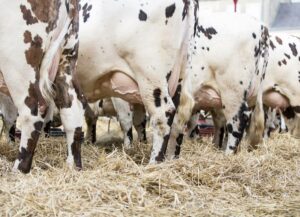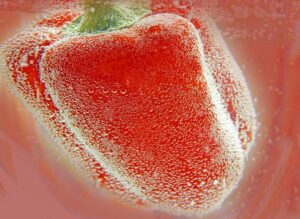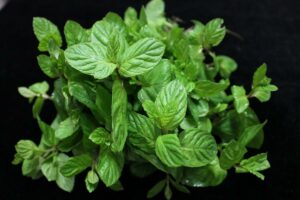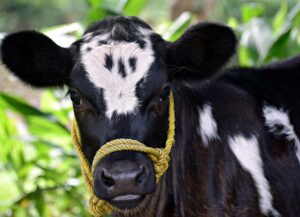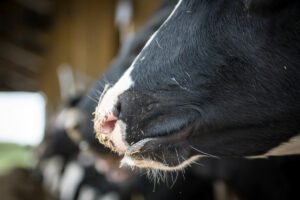Mercedes González & Fernando Diaz
Monensin sodium is an ionophore antibiotic that has been used since the 1980s in ruminant feeding for its growth-promoting effects. It is usually administered as a premix added to feed, water, or total mixed rations (TMR) consumed by cattle. Its use as growth promoter is currently banned in the European Union, it is however still used in many countries. In the US its use is approved in dairy cows added to TMR to increase efficiency in milk production.
Animals for beef receiving monensin in the diet have long been shown to have better feed conversion rates and higher average daily weight gains, which has resulted in significant use. The value of monensin as a promoter of growth in calves grown for beef is that it acts on rumen bacteria modifying its fermentation patterns and the metabolism of nitrogen in the diet.
Monensin improves the ratio of acetate and ruminal propionate, increasing the amount of lactate used to produce propionate. It also decreases deamination and protein degradation in the rumen. Another important effect sought after when used as an additive, is the reduction of the generation of ruminal methane and the decrease of lactic acid under potential acidosis conditions. It also has some reducing effect on frothy bloat, and acts as a coccidiostat to control Cryptosporidium spp. infections, mainly in young calves.
The risks of abusive use of antibiotics
Despite all the contributions to bovine production over time, the abusive use of antibiotics to promote growth in production animals has been discouraged for years, since it is linked to the increased development of antimicrobial resistance. The World Health Organization has declared antimicrobial resistance an emerging global public health threat because of the relationship between antibiotic-resistant bacteria from animals and the risks to human health (van den Bogaard et al., 2000, Donabedian et al, 2003).
With the development of the economies in developing countries such as China, there is an increase in the demand for high-quality proteins (dairy products, meat and eggs). This makes it necessary for animal production to increase its efficiency without having to increase the use of antibiotics as growth promoters. It is for this reason that alternatives have been researched for years.
Plant essential oils as an alternative to antibiotics
One example is some plant distilled essential oils that have microbial growth inhibitory effects that modulate rumen fermentation in a similar way as monensin does. A good candidate is oregano essential oil, which has been attributed potential properties to improve growth rate, feed conversion rates and animal health while modulating fermentation in the rumen.
At this time scientific evidence is still limited on the long-term use of essential oils on growth rates and serum indicators in Holstein calves, so more research studies would be needed to provide more data.
A study (Wu et al., 2020) in China reported that oregano essential oil (OEO) could improve calves’ growth rates by shifting rumen fermentation towards the production of more propionate similarly to monensin, improving also biochemical and immunological serum parameters.
Oregano essential oil and monensin
Monensin and OEO were supplied separately and in combination. Another hypothesis that was evaluated was that the combined contribution could have a better impact on the growth rates of Holstein calves for fattening than their contribution separately, since in this second case an excess of propionate could occur. This study measured growth rates, conversion rates and serum biochemistry and Holstein calves’ immunology.
The calves received a TMR composed of ground corn, soybean meal, cottonseed meal, rapeseed meal, calcium carbonate, sodium bicarbonate, sodium chloride, yellow corn silage, alfalfa and a starter feed (the latter two, supplied only on days 70 to 100 of growth) plus a vitamin-mineral premix.
Four experimental groups were assigned to:
- CON: control, no treatment
- OEO: those receiving only 36 mg of essential oregano oil per kg of DM
- MON: those receiving only 25 mg monensin per kg of MS
- OEO+MON (those receiving monensin and OEO together
Monensin or oregano essential oil separately increased productive performance
Calves that received MON or OEO separated had better growth and feed conversion rates than those that did not receive additives or received them combined.
The calves of the OEO and MON groups had higher body weights at the end of the growth period than CON and OEO+MON groups: 385 and 381 kg in the OEO and MON groups respectively, compared to 368 and 358 kg of the CON and OEO+MON groups, respectively.
Total weight gains in the OEO and MON groups were, respectively, 292 kg and 285 kg compared to the CON and OEO+MON groups with 278 kg and 265 kg. Similarly, the OEO and MON groups had higher average daily weight gains at 1.16 kg/day and 1.22 kg/day, respectively, compared to the OEO+MON group with 1.11 kg/day.
It was observed that the administration of OEO combined with monensin had an interaction, and this affected feed conversion rates (although not statistically significant). However, this caused the MON group to have a slightly higher feed conversion rate than the other groups (0.19 kg of weight gain/kg of DM vs. 0.18 kg of weight gain/kg of DM in the other groups). Dry matter intake was higher in the calves of the OEO group (7.0 kg/day) compared to the other groups (6.5 kg/day).
It is believed that the combined use of monensin and oregano essential oil produced a negative effect on total weight gains and average daily gains and feed conversion, since there may be an antagonistic effect between both compounds. The exact mechanism by which this effect is caused is unknown, but it is speculated that there may be an excess of propionate production, thus changing ruminal fermentation parameters. Propionate is an appetite suppressant in cattle, which negatively affects growth and fattening.
Oregano essential oil as an alternative to monensin
This study concluded that supplementing the diet of growing calves with monensin or oregano essential oil separately, increased productive performance in a similar way. Therefore, oregano essential oil could be a valid alternative to monensin to alleviate restrictions on its use and negative effects such as the risk of producing antimicrobial resistance. However, under the conditions of this study it was observed that the combined use of both additives produced negative effects on performance, probably due to increased ruminal production of propionate.
Reference
Jianping Wu, Yan Bai, Xia Lang, Cailian Wang, Xiaolei Shi, David P. Casper, Liping Zhang, Haibo Liu, Ting Liu, Xuyin Gong, Tingyu Liang, Rui Zhang. Dietary supplementation with oregano essential oil and monensin in combination is antagonistic to growth performance of yearling Holstein bulls. Journal of Dairy Science. 2020 Sept; 103(9): 8119-8129.
© 2020 Dairy Knowledge Center. All Rights Reserved.


